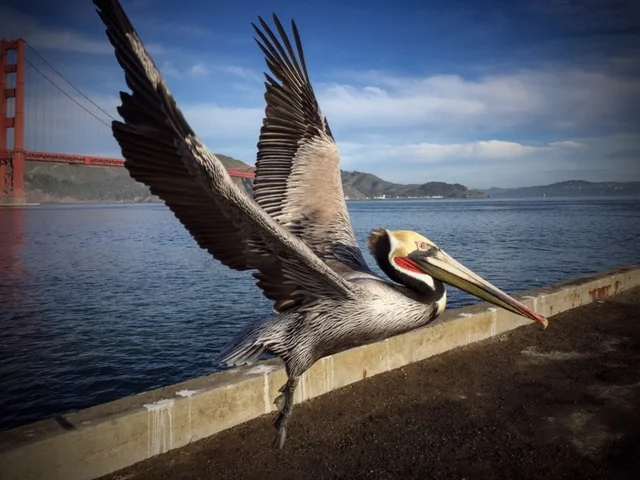A neatly folded $20 bill lay on the ground at my feet as Martine and I walked up to Fort Mason. In front of us six foreign young men were just starting to jog up the hill. I showed her the bill, pocketed it, and we nodded to each other.
"Did any of you lose some money?"
They looked at each other, looked at us, frowned suspiciously.
"Do you speak English?"
At this point one of them said, with a slight accent, "Yes of course we do."
I repeated my original question and one of them finally started fumbling in his pants pocket, to pull out an empty hand.
"Yes. I did!"
They must've decided we were not just looking to shake them up.
"What did you lose?"
When he confirmed it was a $20 bill, I gave it to him. We learned they were running to the bridge and he had their taxi fare home. They were extremely relieved and grateful.
Martine and I proceeded to walk to the bridge and of course the world returned the gift many-fold. The day grew more beautiful by the minute. The bridge was reflected in the calm bay; flower petal clouds danced overhead; the low, low tide invited our footprints onto the sand; and crabs looked for a lift to the water.
A pelican waited for us on the fishing dock as we approached the warming hut. It sat patiently as we posed with it, as if it had been paid for the session. Overhead, the California Brown Pelican seems like just a large brown bird. Up close he had a red chin, pale gold head, eyes inset in pink diamonds, and his gently striated beak ended with a small yellow hook. We worried that he might be injured, but the fisherman assured us he had shown up just before we did.
As we wrapped up our iPhone photo shoot, he flew off in front of us and joined the sea lions and grebes who were fishing nearby.
Really, entry to that walk was the best ticket in town yesterday.


